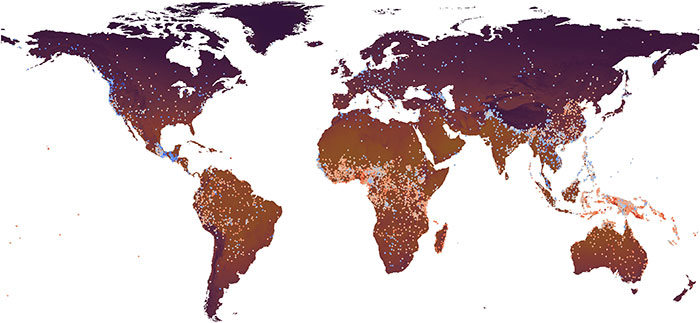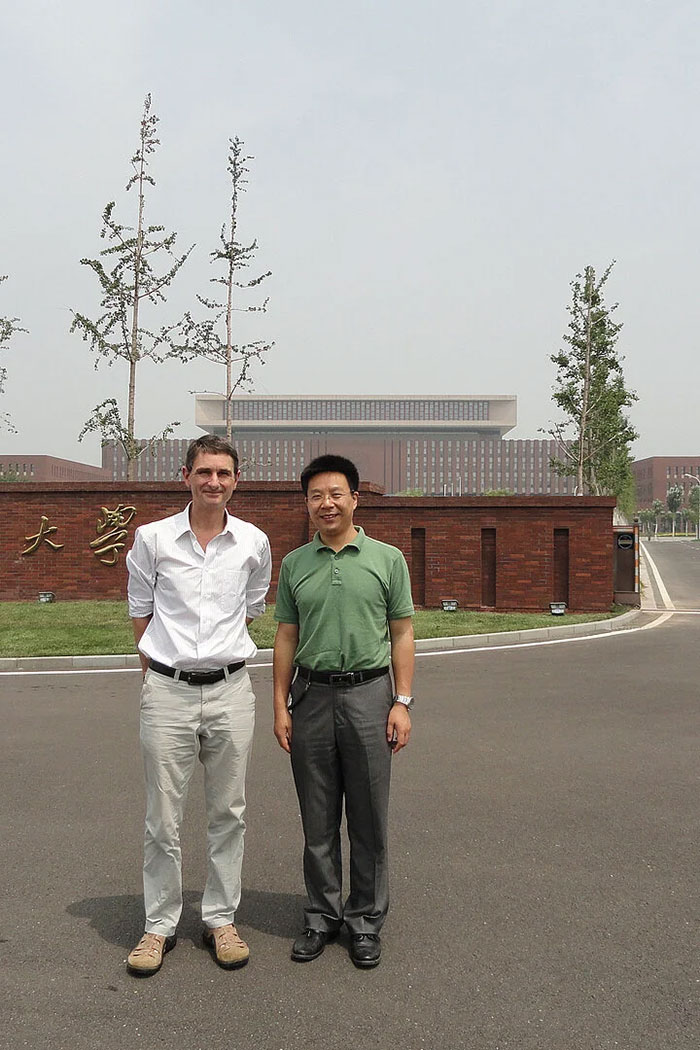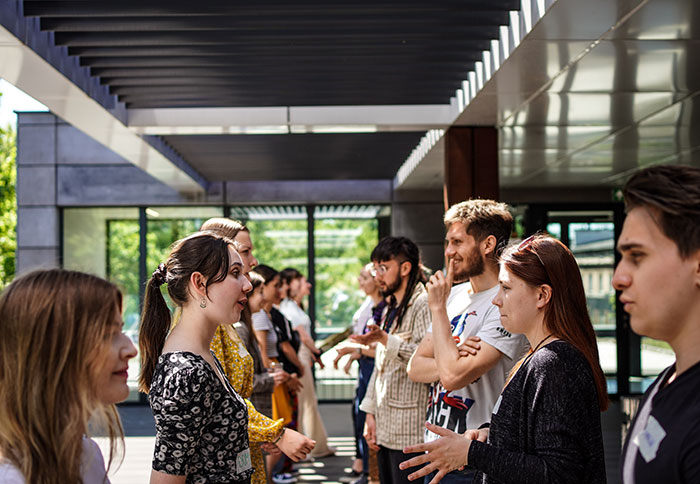
Linguistics Study Reveals Link Between Loudness Of A Language And Region Temperature
We’ve all heard those stereotypes portraying people who speak Latin languages, whether that be Spanish, French, or Italian, as sounding more “passionate” or even “loud”.
As it turns out, the stereotype may stem from some truth, as a new study published on Thursday (December 5) suggested that temperatures influence the way we talk.
Dr. Søren Wichmann, a linguist at Kiel University in Germany, together with colleagues from China, demonstrated in the study that was published in the online journal PNAS Nexus that average ambient temperatures influenced the loudness of certain speech sounds.
Languages in warmer regions are louder than those in colder regions, a linguistics study found
Image credits: Tianheng Wang, Søren Wichmann
Søren explained: “Generally speaking, languages in warmer regions are louder than those in colder regions.”
To summarize the study, we are surrounded by air when we speak and listen; therefore, spoken words are transmitted through the air as sound waves, as per Phys Org. As a result, the physical properties of air influence how easy it is to produce and hear speech.
Søren explained: “On the one hand, the dryness of cold air poses a challenge to the production of voiced sounds, which require vibration of the vocal cords. On the other hand, warm air tends to limit unvoiced sounds by absorbing their high-frequency energy.”
Image credits: Qian Gu
These factors could reportedly favor a higher volume of certain speech sounds in warmer climates, known as sonority in scientific terms.
The Danish linguist and his colleagues reportedly used the Automated Similarity Judgment Program (ASJP) database to test whether these factors really had an effect on the development of languages.
We are surrounded by air when we speak and listen. Therefore, spoken words are transmitted through the air as sound waves
Image credits: Łukasz Maźnica
At the moment, the database is reported to contain the basic vocabulary of 5,293 languages and is constantly being expanded with the support of the ROOTS Cluster of Excellence, a German research institution in Kiel.
Subsequently, Søren and his team discovered that languages that occur around the Equator in particular have a high average sonority, whereas languages in Oceania and Africa have the highest corresponding index.
On the other hand, the world record for low sonority reportedly belongs to the Salish languages on the northwest coast of North America.
Image credits: Priscilla Du Preez 🇨🇦
Nevertheless, some exceptions have been found in this trend. For instance, some languages in Central America and on the Southeast Asian mainland have a rather low mean sonority, even though they are spoken in very warm regions.
Søren stated: “Overall, however, we were able to establish a clear relationship between the mean sonority of language families and the mean annual temperature.”
The physical properties of air influence how easy it is to produce and hear speech
Image credits: MART PRODUCTION
As a result, the exceptions indicate that the effects of temperature on sonority develop only slowly and only shape the sounds of a language over centuries or even millennia.
Scientists are reportedly in the midst of discussing the extent to which the environment shapes languages.
Image credits: Gabriel Foureaux
The linguistics expert revealed: “For a long time, research assumed that linguistic structures are self-contained and are not influenced in any way by the social or natural environment. More recent studies, including ours, are beginning to question this.”
Søren further informed that “If languages adapt to their environment in a slow process lasting thousands of years, then they carry some clues about the environment of their predecessor languages.”
Many readers found the news hilarious
33Kviews
Share on FacebookCorrelation doesn’t imply causation. A correlation between variables, however, does not automatically mean that the change in one variable is the cause of the change in the values of the other variable. Causation indicates that one event is the result of the occurrence of the other event; i.e. there is a causal relationship between the two events.
It doesn’t INHERENTLY mean causation, but there CAN be causation, which is why there tends to be follow-up research to find out whether the correlation is causative or not.
Load More Replies...I have noticed that when the humidity drops, usually in cold weather, I can hear the neighborhood sounds much better. The train, four blocks away, is barely audible in warm humid weather, but in winter, it sounds like it's coming through the house.
Germany isn't that loud. But many people who saw the Hitler speeches, think they are still that loud.
Load More Replies...Yes, us Aussies are definitely loud and I'm sure the Kiwis would agree
Mexico is such a loud country. My neighbors where blaring music all morning..the shops all have loud music on broken blown out speakers. The church bells would go on forever some times, two of the church's in the dessert valley would go at "war" with each other..cannons sometimes to scare away "spirits" or pigeons. I loved my time in Mexico, a very warm culture. I'm back in Canada, it's almost to quite.
Another stupid one who cannot discern between DESSERT and DESERT, you f u c kwad.
Load More Replies...To test this theory, you'd need to show that people from warm countries speak more softly when they're visiting, or living in, a colder country.
They obviously didn't visit Wisconsin while they researched. We're all loud and also freezing.
This explains a lot in traditional singing around the world phonetically speaking
Correlation doesn’t imply causation. A correlation between variables, however, does not automatically mean that the change in one variable is the cause of the change in the values of the other variable. Causation indicates that one event is the result of the occurrence of the other event; i.e. there is a causal relationship between the two events.
It doesn’t INHERENTLY mean causation, but there CAN be causation, which is why there tends to be follow-up research to find out whether the correlation is causative or not.
Load More Replies...I have noticed that when the humidity drops, usually in cold weather, I can hear the neighborhood sounds much better. The train, four blocks away, is barely audible in warm humid weather, but in winter, it sounds like it's coming through the house.
Germany isn't that loud. But many people who saw the Hitler speeches, think they are still that loud.
Load More Replies...Yes, us Aussies are definitely loud and I'm sure the Kiwis would agree
Mexico is such a loud country. My neighbors where blaring music all morning..the shops all have loud music on broken blown out speakers. The church bells would go on forever some times, two of the church's in the dessert valley would go at "war" with each other..cannons sometimes to scare away "spirits" or pigeons. I loved my time in Mexico, a very warm culture. I'm back in Canada, it's almost to quite.
Another stupid one who cannot discern between DESSERT and DESERT, you f u c kwad.
Load More Replies...To test this theory, you'd need to show that people from warm countries speak more softly when they're visiting, or living in, a colder country.
They obviously didn't visit Wisconsin while they researched. We're all loud and also freezing.
This explains a lot in traditional singing around the world phonetically speaking

 Dark Mode
Dark Mode 

 No fees, cancel anytime
No fees, cancel anytime 

































































61
26